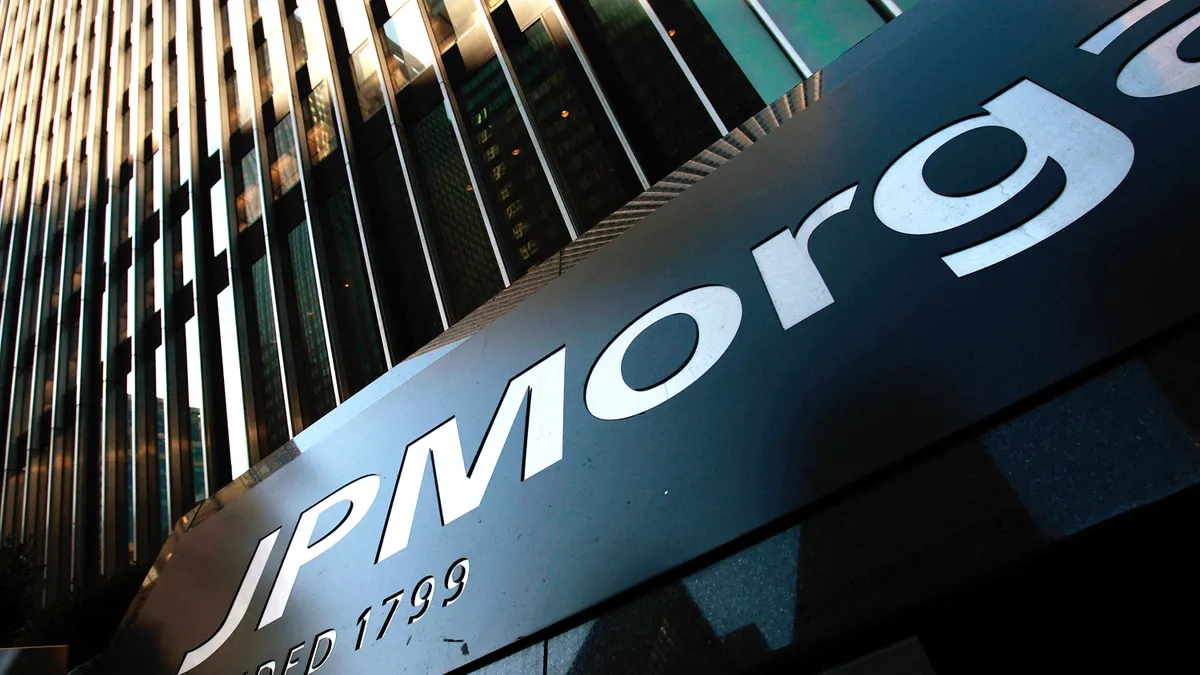Dive Brief:
- JPMorgan Chase is expanding its 18-month-old effort to help people with criminal backgrounds return to the workforce, the bank said Monday. About a year-and-a-half after launching a pilot program in Chicago to that effect, the bank is partnering with nonprofits in Columbus, Ohio, to connect people with arrest or conviction histories to in-demand jobs.
- The bank's CEO, Jamie Dimon, will also co-chair the Second Chance Business Coalition, an initiative that gives 29 member companies such as Microsoft, Walmart, General Motors, McDonald's and Bank of America a forum to share resources and advice on connecting people with criminal pasts to new employment opportunities.
- JPMorgan also announced it is investing an extra $12.5 million in community organizations in Los Angeles, New York, Seattle, Chicago, Delaware and Nashville, Tennessee, that give training, financial health resources, legal advice and job leads to people with criminal pasts. That commitment builds on a $7 million pledge announced in 2019.
Dive Insight:
JPMorgan's stance on second chances for job seekers with arrest or conviction records is hardly new. The bank in 2018 removed all questions about criminal backgrounds from job applications and says it only runs a background check after an offer is made. The following year, it established a policy center to reduce barriers to re-employment for people with criminal pasts.
The bank said about 10% of its new U.S. hires in 2020 — more than 2,100 people — had arrest records, a figure that has held steady since about 2018.
What has changed since 2018 is a more widespread, conscious effort from corporations to combat racial inequality — especially since the May 2020 murder of George Floyd, a Black man, by police, and its subsequent protests. Dimon's fellow Second Chance Business Coalition co-chair, Eaton Corp. CEO Craig Arnold, who is Black, noted the racial disparity in criminal records in a statement launching the organization.
"A felony conviction may as well be a life sentence when it comes to reentering the workforce," Arnold said. "Another hard truth is that the criminal justice system in the U.S. disproportionately affects people of color."
Dimon has maintained that companies' reluctance to hire people with criminal backgrounds represents a missed opportunity for the economy as a whole. The U.S. loses between $78 billion and $87 billion in annual gross domestic product by excluding people with criminal records from entering the workforce, JPMorgan research found in 2019.
"America believes in second chances and redemptions," Dimon wrote in his annual shareholder letter this month. "Getting a second chance will give people dignity and enable them to earn a higher lifetime income while reducing recidivism and all of its related costs."
JPMorgan is set to partner in Columbus with organizations such as the city's Center for Employment Opportunities, Goodwill Columbus, Columbus Urban League and The Legal Aid Society of Columbus to give job search support, mentorship and legal services to second-chance job seekers.
Columbus represents a hub for the bank, which employs about 19,000 people in the area.
"Now more than ever, Central Ohio needs an economy that works for more people," Corrine Burger, chief control officer and Columbus location leader for JPMorgan Chase, said Monday in a press release. "Breaking down barriers to employment not only helps connect businesses with qualified workers, but also unlocks opportunity across the community and strengthens our region. When we create hiring practices and policies that give people a second chance at stable employment, we all win.”














